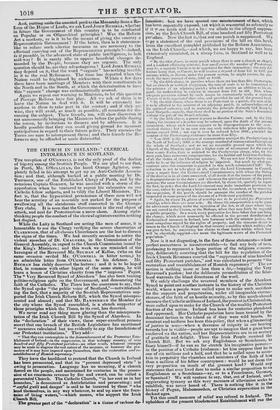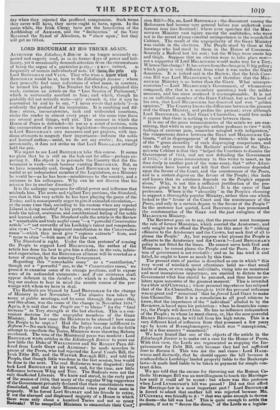THE CHURCII IN IRELAND:' CLERICAL INTOLERANCE IN SCOTLAND.
THE reception of O'CONNELL is not the only proof of the decline of bigotry among the Scottish People. We are glad to see that, in Perth, Mr. O'Sueeivear, the hired Orange Agitator, com- pletely failed in his attempt to get up an Anti-Catholic Associa- tion; and that, although backed at a public meeting by Dr. Tnomsore one of the Established Clergy of Perth, and by the notorious Captain GORDON, he was assailed with a storm of dis- approbation when he ventured to repeat his calumnies on our Catholic fellow subjects, and to vilify the Liberal Ministers. The fact is, that the hypocritical pretensions of these men will not hear the scrutiny of an assembly not packed for the purpose of swallowing all the slanderous stuff concocted in the Orange- Tory clubs. It is seen that the Government is the real object of attack, and zeal for Protestantism a mere sham. Among right- thinking people the conduct of the clerical agitators excites nothing but disgust.
While the Laity in Scotland are acting like men of sense, it is lamentable to see the Clergy verifying the severe observation of CLARENDON, that of all classes Churchmen are the last to discern the signs of the times. We had recently occasion to notice the violent speeches of Dr. CHALMERS, in the Commission of the General Assembly, in regard to the Church Commission issued by the King's Ministers; and this week we are reminded of the harangue of the Reverend Mr. BUCHAN of Kelloe, (who on the same occasion reviled Mr. O'Coanezet. in bitter terms,) by an admirable letter from O'CONNELL to his defamer. Mr. BUCHAN has richly deserved the lecture; and it is to be hoped that, in common with other bigots of the same stamp, he will learn a lesson of Christian charity from the " impious'' Papist. The " Very Reverend Synod of Aberdeen" has also been venting politico-religious spite on the Government, and denouncing the faith of the Catholics. The Times has the assurance to say, that the Synod spoke "the public voice of Scotland,"—notwithstand- ing the fact, that a majority of the Scottish Representatives sup- ported the Irish Church Reform Bill, which the Synod misrepre- sented and abused; and that Mr. BANNERMAN the Member for the city where the Synod assembled, is a stanch supporter of those principles which the Times, to its cost, has deserted.
We never read any thing more glaring than the misrepresen- tation of the Irish Church Bill by the Synod of Aberdeen. In the "declaration" of their views, these super-excellent persons assert that one branch of the British Legislature has sanctioned " measures calculated but too evidently to sap the foundations of our Protestant institutions." They add-
., That they can contemplate in the dismemberment of the Protestant Esta- blishment of Ireland—in the suppression, in that unhappy country, of nine hundred and fifty Protestant parishes—no other result, whatever attempts may be made to disguise the real nature of the measure, or however the pro- moters of it may have imposed upon themselves, than the restoration and re- nstablishment of Romish supremacy."
They have the hardihood to pretend that the Church in Ireland has been persecuted, and that its "present depressed state" is owing to persecution. Language has no meaning, if a church forced on the people, and maintained for centuries in the posses- sion of an enormous revenue by fire and sword, can be called a persecuted Church. The Catholic Church, "in her root as in her branches," is denounced as Antichristian and persecuting; and " awful guilt and danger" is said to be incurred by those " who lend themselves, in any way whatever, to seal up anew the foun- tains of living waters,"—which means, who support the Irish Church Bill.
The greater part of the "declaration" is a tissue of verbose de- famation; -but we -heft +tooted one -misstatement of foot, whielt has been. repeatedly exposed. s et which is reasserted as solemnly as if it w ere truth and not a lie: we allude to the alleged suppres- sion, oy the Irish Church Bill, of nine hundred and fifty Protestant parishes. Now the fact is, that not one parish is suppressed. We ce.py a statement of the real provisions of the bill on this head, from the excellent pamphlet published by the Reform Association, on the Irish Church,—toad which, we are happy to say, has been extensively circulated, in a cheap fsrin, in Scotland as well as in England.
" By the 61st chive, in every pat ish where there is now a church or chapel, and a resident officiating minister, hate small soerer the number of Protestants. way be, a separate Curate is to be appointed for their instruction ; the only " By the 62l clause, where there is no l'rotestant in a parish, the sum of 5/. is to be allotted to the minister of an adjoining parish, in acknowledgment of his spiritual authority, and to maintain the principle distinctly laid down by Lord Morpeth—nainely, that there shall be no portion of the State's dominions without the pale of the Stite's religion. " By the 70th clause, a power is given to dissolve Unions; and, by the 77th clause, the income of a benefice may be 'educed, upon the death of the present incumbent, where such income appears to be disproportionate to the cede • siastical duties; hot in no ease can any such reduction take place unless the income exceed :300/. ; nor can it ever be reduced below 3001., provided the number of the Protestant parishioners be more than fifty. " Now 300/. is the maximum of remuneration amongst the Presbyterians in the North of Ireland ; 3001. is the average standard of remuneration throughout the whole of Seothind ; and we see no reasonable ground upon which the Church of the Minority can claim a higher scale of recompense for the care of their scanty flocks, than is assigned to the Presbyterian clergy, who, for the most part, have numerous congregations, for the faithful and laborious discharge of all the duties of the Christian ministry. \Ve see not how Christianity can suffer by it, or the influence of relig' he impaired. But mark by what pre- cautions even this concession is gut:titled in this much-calumniated bill ! f he reduction is not to take place at all, unless the Lord•Lieutenant in Council, anon a report from the Ecclesiastical Commissioners, with whom the Bishop of the diecese is in all eases associated, shall decide that the income of the parish is disproportionate to the duty : and whenever the spiritual wants of the parish increase, the same Commissioners are directed, by clause 84, specially to report the fact, in order that the Lord-Lieutenant may make immediate provision for the case, either by assigning a larger income to the incumbent, or by removing the suspension, if the parish should be amongst the number of the parishes suspended in consequence of the absence of a Protestant population. " Again, by clause 74, places of worship are to be provided fir Protestant worship, where there are none now. By clause 83, compensation is to be given for advowsons coming under the operation of the Act, in all cases where they are not vested in the Crown, or the Bishops, when they may fairly be regarded as public property. In a word, every precaution has been taken that can bring the change, which must necessarily be effected in the present distribution of Ecclesiastical revenues in Ireland, into harmony with the strictest justice, the most scrupulous regard for the rights of property, and the sincerest desire to insure to the Church of England in that country a stability which nothing else can give to her, by narrowing her claims to those limits within which they will be cheerfully supplied—we mean the legitimate wants of the Protestant population." Now is it not disgusting, in the face of these statements—whose perfect correctness is incontrovertible—to find any body of men, professing to represent a large portion of the religious commu- nity, deliberately asserting that the bill for the regulation of the Irish Church Revenues enacted the "suppression of nine hundred and fifty Protestant parishes;' and was calculated to promote " the restoration and reestablishment of Romish supremacy ?" The as. sertion is nothing inure or less than a lie,—begging the Very Reverend's pardon; but the deliberate premeditation of the false- hood warrants the blunt directness of the word. We safely challenge the reverend members of the Aberdeen Synod to point out another instance in the history of the Christian world, where a people were called upon to make such sacrifices for the support and perpetuation, under all imaginable circum- stances, of the faith of an hostile minority, as by this much-abused measure the Catholic millions of Ireland, the poorest in Christendom, were called upon to make for the Church of the wealthy Protestant fraction of the nation. Ireland has been for centuries plundered and oppressed. Her Catholic population have been treated by the dominant faction in the island as if they were wild beasts. So constant and uniform has been this policy, that when a glimmering of justice is seen—when a decrease of iniquity in our bearing towards her is visible—people are apt to imagine that a great boon conferred on the nation, and her Representatives are in an ecstacy of gratitude and delight. Thus time Irish People received the Church Bill. But we ask any Englishman or Scotchman, to fancy himself—if he can so far stretch his imaginative powers— in the position of a Catholic Irishman : let him suppose that he is one of six millions and a half, and that he is called upon to main- tain in perpetuity the churches and ministers of the faith of less than a million of his fellow countrymen : would he not deem the very proposition an insult of the grossest kind ? Would any statesman that ever lived dare to make a similar proposition to an Englishman or a Scotchman—ay, or to a Frenchman, German. or Spaniard? We will venture to say, that, out of Ireland, such aggravating tyranny as this very measure of alleviation seeks to i establish, was never heard of. There is nothing like it in the history of Pagan, Mahommedan, or Christian superstition in the darkest ages. Yet this small measure of relief was refused to Ireland. The upholders of the present bloodstained Establishment will rue the day when they rejected the proffered compromise. Such terms they never will have, they never ought to have, again. In the mean while, the Irish Clergy have got the benediction of the Archbishop of ARMAGH, and the " declaration " of the Very Reverend the Synod of Aberdeen, to " chew upon r but they will get no tithes.



























 Previous page
Previous page